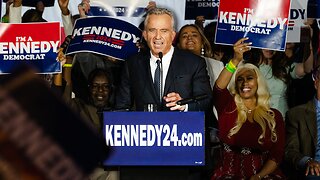Premium Only Content

The Best Type of Balanced Budget Amendment | BBA EXPLAINED
The United States is 30 trillion dollars in debt! We have more debt relative to our GDP than at any other point in our history! And so we need to fix this sinking ship or else America will go down under the weight of her debt obligations!
One tool that will help us reduce our debt addiction is a Balanced Budget Amendment…
“Research shows that balanced budget amendments lead to greater fiscal discipline.”
46 out of 50 states have some form of a Balanced Budget Requirement (BBR) and many countries have one too such as Germany, Italy, Poland, Slovenia, Spain, and Switzerland.
Regardless of your political affiliation, I believe we should all support a Balanced Budget Amendment, but the more difficult question is… what’s the best type of balanced budget amendment? Not all balanced budget amendments are created equal!
Balanced Budget Amendments exist on a spectrum from lenient to strict so let’s explore the multitude of factors that go into making a Balanced Budget Amendment so we can design the best one for ‘Merica…
First, should our Balanced Budget Amendment be a constitutional amendment or should it just be a statutory provision? A statutory provision could easily be overridden by a simple majority vote therefore to increase the constraining power of our balanced budget requirement it should be a constitutional amendment. Virtually every state has their BBR as a BBA.
Second, should our Balanced Budget Amendment force the budget to be balanced on a yearly or a cyclical basis? A few nations in Europe have a cyclical BBR. The advantage of a cyclical BBR is it’s easier to predict government revenue over a business cycle rather than over the course of a year, but the problem is it’s also easier to game because of its increased complexity. For example, in 2005 the UK Treasury revised its national account data, which shifted their previous business cycle’s start from 1999 to 1997.
Every state in the US has there BBR on a yearly basis and so in the name of simplicity and Americana I believe our federal government’s should be yearly too.
Third, should our Balanced Budget Amendment include the whole budget or should certain programs be exempt? The 1995 Balanced Budget Amendment lost by just two votes in the Senate because it didn’t exempt Social Security. Ideally, though, no program should be exempt because politicians could move funds to get around the requirement like a mobster washing his money through the laundromat. If a program is worthy, which I believe Social Security is, then it should be worthy enough to be accounted for. With that said, we shouldn’t let purity stop progress. Let’s not die again on this hill! After all, on the state-level, “capital and pension funds are usually exempt from BBR limitations.” And since 1995, our Social Security trust fund has almost been depleted anyway so it’s not like there’s much money to withdraw; Plus, any politician that would suggest doing so would quickly find themselves living off of Social Security as they’d be put in permanent political retirement.
Fourth, should our BBA only require that a balanced budget be proposed or does one also have to be signed? And does it merely have to be planned at the start of the year or does it have to also be balanced by the end of the year? In some states, the legislature merely has to propose a balanced budget, but in the end, the governor could sign one that’s unbalanced. In order to reduce gaming and discourage overestimating revenues & underestimating expenditures, our federal budget should not only be balanced at the beginning, but also in the end. 38 states require both.
Fifth, how big of a supermajority should legislators need to override the balanced budget requirement: three-fifths (60%), two-thirds (66.67...%), or three-quarters (75%)? The 1995 BBA would have required a three-fifths supermajority, which is a good compromise between not being too lenient or too strict. A super strict BBR could make recessions worse by forcing governments to make cuts or increase taxes at a time when money is already tight. The goal of a BBR isn’t to make deficit spending impossible, but to make it harder. A BBR serves as a North Star so that when our Ship of State veers off to avoid a storm we can ultimately get back on course.
Sixth, should there be exceptions to the 60% override in the case of war, recession, or a national emergency? No. Opportunistic politicians could too easily declare war on some small country or even on an abstract cause like “terrorism” or “climate change.” They could also declare a recession at the slightest downturn or based on a single economic indicator and they could declare a “national emergency” on basically any issue their base cares about from a border emergency to an inequality emergency!
-
 9:09
9:09
Anthony Galli
1 year agoThe Truth About RFK Jr.
52 -
 LIVE
LIVE
The Official Steve Harvey
12 days ago $4.83 earned24 HOURS OF MOTIVATION w/ STEVE HARVEY
1,555 watching -
 25:56
25:56
DeVory Darkins
17 hours ago $0.16 earnedTrump drops ULTIMATE BOMB on Democrat Mayors as ICE makes SHOCKING Announcement
11.9K99 -
 LIVE
LIVE
TonYGaMinG
2 hours ago🟢 ABI WITH FRIENDS | 🍩JOE DONUTS | 😶 🌫 VLADSGAMINGCARTEL |
53 watching -
 21:24
21:24
marcushouse
8 hours ago $0.02 earnedStarship Flight 10: Go or No? 🚀
4.22K7 -
 LIVE
LIVE
MrR4ger
14 hours agoSUNDAY FUNDAY w/ R4GER - VARIETY / DIABLO 4/ FOR HONOR / ETC?
114 watching -
 5:40
5:40
WhaddoYouMeme
3 days ago $0.13 earnedThey’re Calling This the End of Masculinity
5.95K4 -
 15:24
15:24
Tactical Advisor
17 hours agoBest 2011 of 2025 | Bul Armory Ultralight Pro
4.59K -
 27:31
27:31
True Crime | Unsolved Cases | Mysterious Stories
2 days ago $0.03 earnedThe Hong Kong Schoolgirl Mystery – 5 Mysterious Unsolved Cases (Part 8)
5.38K1 -
 7:19
7:19
China Uncensored
23 hours agoChina is DONE in the South China Sea
6.67K17